
The article focuses on designing and implementing effective B2B sales processes through a systematic approach encompassing:
It emphasizes the importance of utilizing methodologies such as Solution Selling and automation tools like CRM systems. These strategies enhance efficiency and effectiveness in navigating the complexities of B2B transactions, ultimately driving revenue growth and client satisfaction.
In the competitive landscape of B2B sales, grasping the intricacies of the sales process is essential for businesses aspiring to thrive. This article explores the fundamental components that characterize successful B2B sales strategies, encompassing:
It underscores the significant differences between B2B and B2C sales, highlighting the necessity of tailored approaches that resonate with the unique dynamics of business transactions. By examining methodologies such as:
Alongside the integration of technology and automation, this article offers a comprehensive roadmap for organizations aiming to enhance their sales effectiveness. With a focus on best practices and innovative frameworks, this exploration serves as a guide for businesses seeking to optimize their sales processes and achieve sustainable growth in an ever-evolving market.
B2B sales processes involve a systematic series of steps that businesses undertake to sell products or services to other organizations. Understanding the following key concepts is crucial for developing effective sales strategies tailored to the unique dynamics of B2B transactions:
Lead Generation: This foundational process identifies potential clients who may have an interest in your offerings. In 2025, the importance of client acquisition continues to rise, with 85% of B2B marketers utilizing email marketing tools to enhance their outreach and engagement strategies. This widespread adoption not only aids in identifying potential customers but also underscores the critical role of targeted communication in reaching broader audiences.
Qualification: Once leads are generated, the next step is qualification, which involves assessing whether these leads align with the target customer profile. This procedure ensures that marketing teams concentrate their efforts on leads with the greatest potential for conversion, thereby enhancing resource distribution. A clear understanding of qualification criteria is essential for maximizing revenue efficiency. Employing customized structures from Magical Selling can refine this process, ensuring that professionals are prepared to recognize and connect with the appropriate prospects efficiently.
Transaction Cycle: The transaction cycle refers to the duration from the initial contact with a lead to the finalization of a deal. Understanding the nuances of this cycle is essential for teams to manage their time effectively and enhance conversion rates. Techniques from the Solution Selling Module, costing $149.00, can empower sales experts to navigate this cycle with increased confidence and success.
Client Relationship Management (CRM): Efficient CRM systems are essential resources for managing interactions with both prospective and existing clients. These systems facilitate improved data management and tailored client interactions, becoming increasingly crucial as 81% of sales groups invest in AI technologies to enhance sales data quality and boost client engagement. For instance, CRM systems can automate follow-ups and provide insights into client behavior, resulting in more informed sales approaches. By integrating these insights with the Heart of the Deal Method, sales teams can elevate their approach to customer relationships.
Integrating these concepts into your sales plan not only simplifies the B2B sales processes but also aligns with current trends in B2B selling. For example, the worldwide door-to-door market, valued at $200.14 billion in 2022, is expected to grow at an annual rate of 6.4% through 2030, emphasizing the expanding opportunities within B2B transactions.
By concentrating on lead generation and qualification, companies can significantly enhance their revenue results. As industry specialists note, leveraging generative AI tools enables marketers and representatives to swiftly grasp new concepts and approaches, further boosting their effectiveness in the competitive B2B environment. This strategic method for understanding and executing B2B sales processes, supported by the customized frameworks and techniques from Magical Selling and incorporating elements from the Seller Dimension, is essential for achieving enduring growth and success.
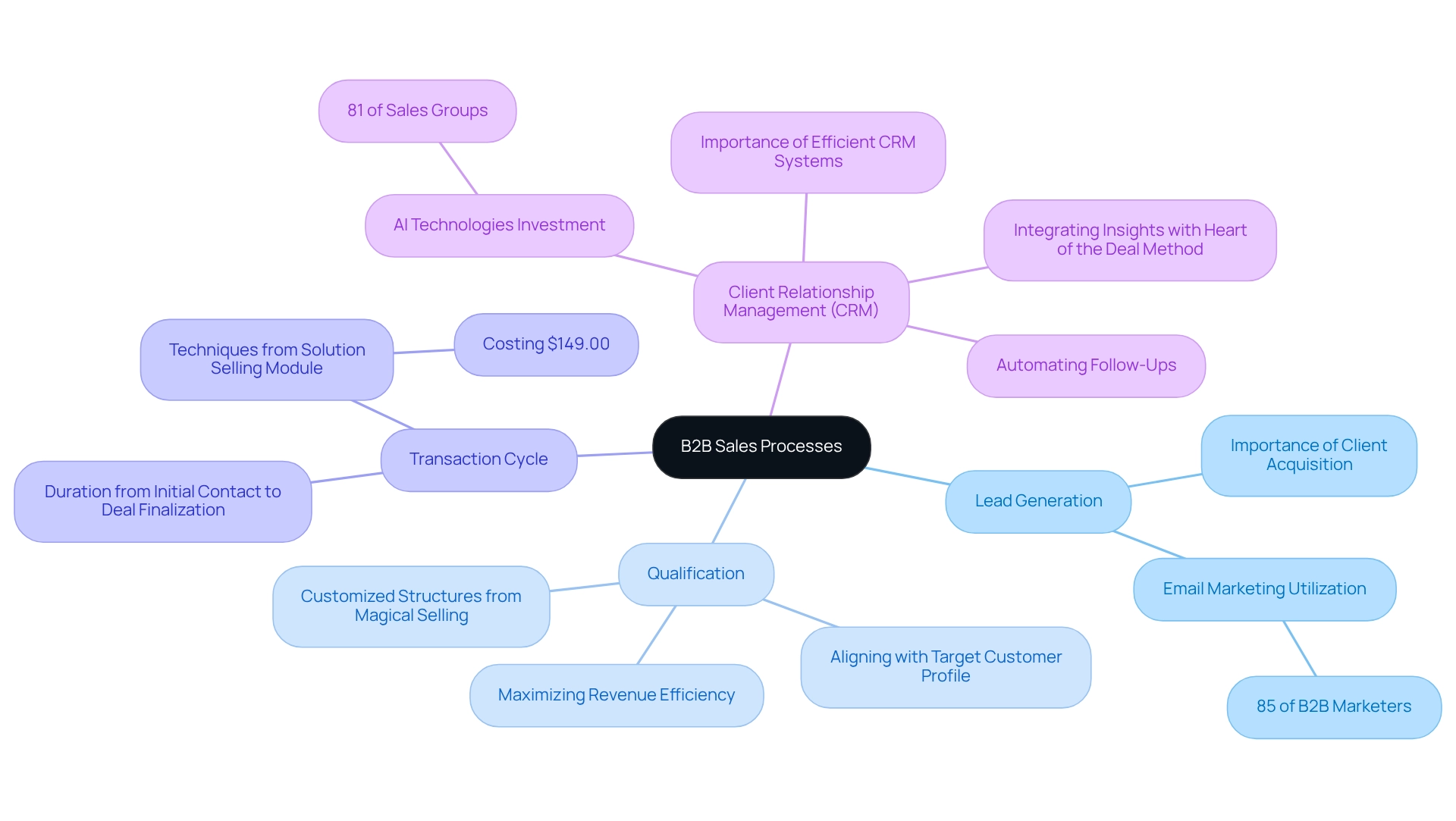
B2B (Business-to-Business) transactions represent a distinct category of dealings between companies, sharply contrasting with B2C (Business-to-Consumer) exchanges, which are tailored to individual customers. Understanding the key distinctions between these two commercial models is crucial for developing effective strategies within B2B sales processes.
Decision-Making Process: In B2B transactions, the decision-making process is typically more intricate, involving numerous stakeholders and extended decision cycles. This contrasts with B2C transactions, where choices are often made quickly by individual consumers. Research indicates that the typical decision-making time in B2B transactions can extend from several weeks to months, underscoring the necessity for comprehensive assessment and consensus among various parties. To navigate this complexity, companies like Magical Selling have successfully revamped their go-to-market strategies and optimized their B2B sales processes. This enables regional infrastructure providers to compete effectively against cloud giants by aligning their revenue approaches with customer needs, resulting in immediate improvements in deal decision skills.
Transaction Volume and Value: B2B transactions generally involve larger quantities and higher monetary values compared to B2C exchanges. This is due to the characteristics of business acquisitions, which frequently entail bulk orders or long-term agreements, necessitating a more strategic approach to transactions. For instance, the Service-as-a-Service solutions introduced by Magical Selling have facilitated swift client acquisition, assisting companies in securing substantial contracts and expanding their market presence in competitive sectors such as hospitality.
Relationship Focus: Establishing enduring relationships is foundational to B2B commerce. Unlike B2C, which often emphasizes transactional interactions, B2B transactions thrive on trust and ongoing engagement. Successful relationship management can lead to heightened customer loyalty and recurring business, as demonstrated by case studies showing that nurtured leads can generate a 20% increase in business opportunities compared to non-nurtured leads. Furthermore, with 80% of B2B buyers utilizing their mobile phones for researching and purchasing products, understanding buyer behavior is essential in this digital age. Businesses that adapt their selling approaches to foster these connections, as illustrated by Magical Selling's effective transformation methods, are more likely to succeed.
Understanding these distinctions is vital for crafting approaches that resonate within the B2B sales processes. As the landscape evolves, particularly with the rise of digital platforms like LinkedIn—favored by 80% of B2B marketers for content promotion—the ability to adapt and nurture relationships will be paramount for success. Additionally, as Stephan Wenger notes, B2B will invest 10.11 billion U.S. dollars in MarTech by 2025, highlighting the financial commitment businesses are making towards enhancing their marketing strategies.
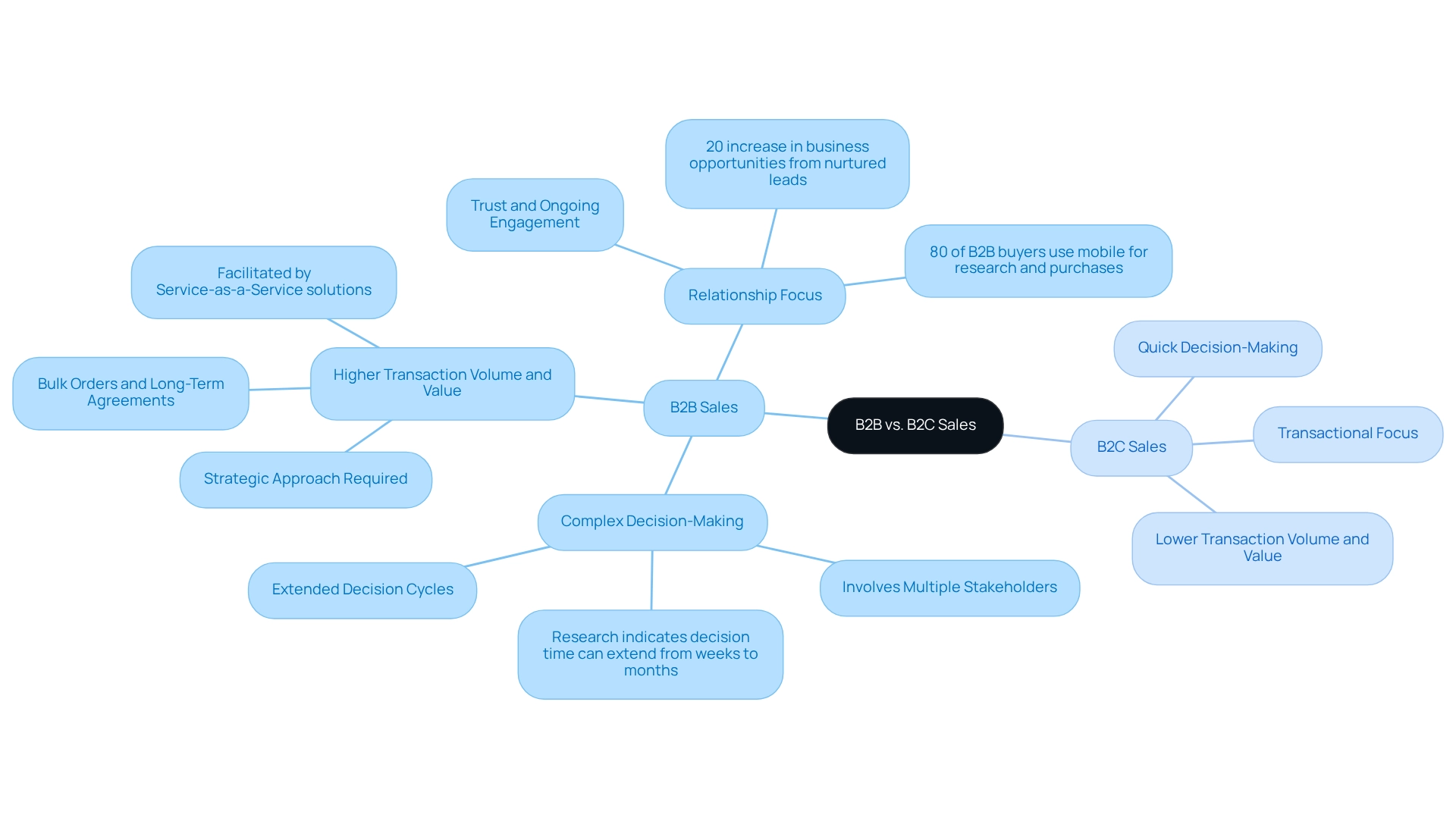
The B2B sales process is a structured journey that typically unfolds across several critical stages, each designed to guide potential customers toward a successful conversion:
Each phase of the B2B sales process is essential for guiding prospects through the funnel and ultimately transforming them into loyal clients. Statistics show that 74% of customers favor representatives who proactively contribute value and insights throughout the selling process, highlighting the significance of a strategic method at every stage. By concentrating on needs evaluation, utilizing expert knowledge, and cultivating prospects with customized content, teams can improve their efficiency and boost higher conversion rates, attaining concrete outcomes within three months through tailored solutions from Magical Selling.
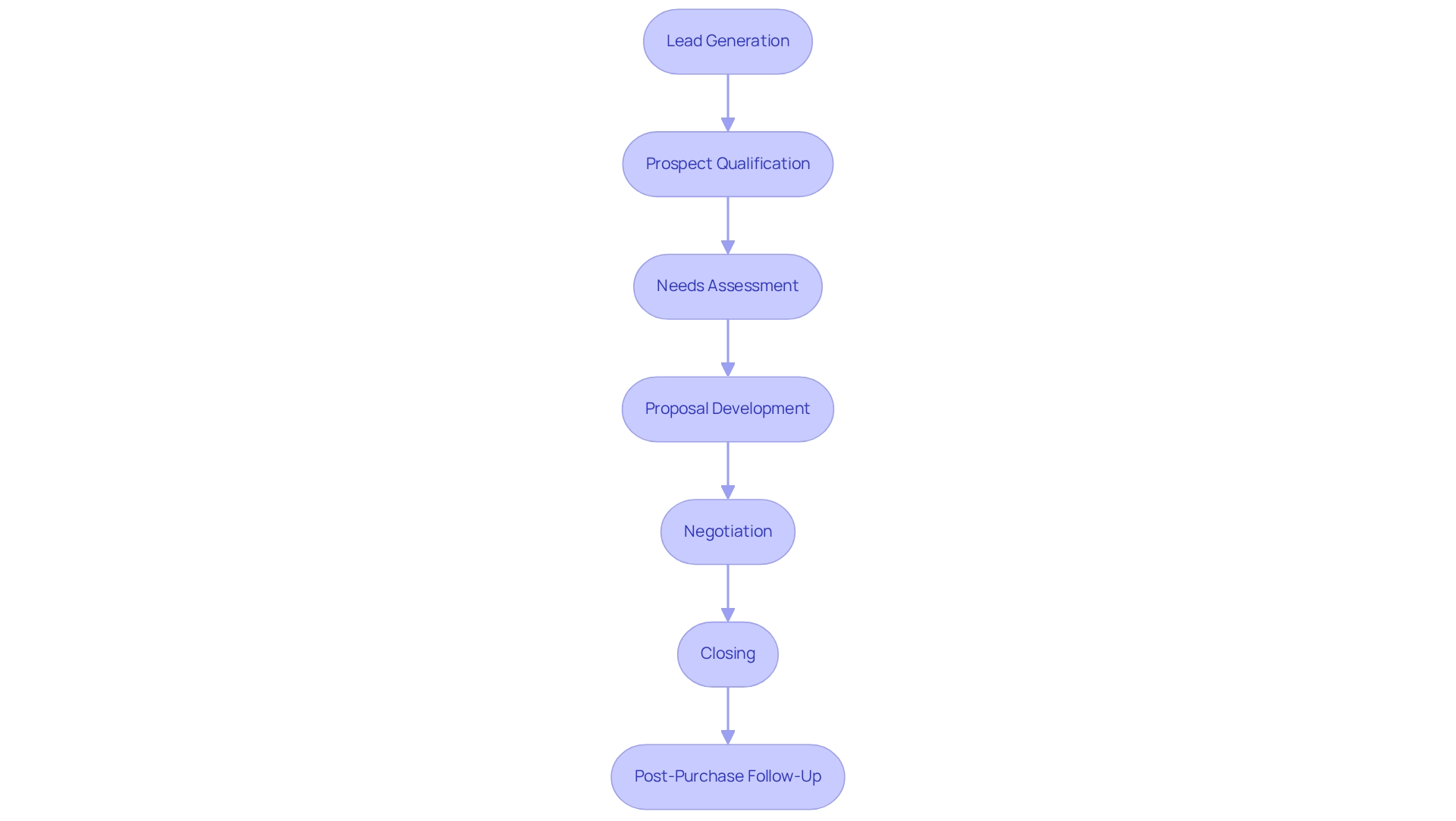
Creating effective B2B sales processes demands the careful selection of methodologies and frameworks that resonate with the unique needs of your target audience. Key approaches include:
To successfully implement these B2B sales processes, a comprehensive understanding of your target market and the specific challenges they face—such as limited resources and the necessity for differentiation in a saturated market—is vital. For instance, overhauling the approach to market entry and revenue generation for regional infrastructure providers to compete with cloud giants can be transformative. Customizing your selling approach to incorporate these frameworks will ensure coherence with your overall business strategy, ultimately leading to improved results and enhanced sales effectiveness.
As we navigate the complexities of the competitive landscape, it is crucial to recognize that effective strategies hinge on our ability to articulate value and respond adeptly to the options presented by competitors and disruptors. Furthermore, upgrading organizational capabilities and enhancing individual sales representatives' skills are essential steps in refining sales processes, as highlighted in recent industry news.
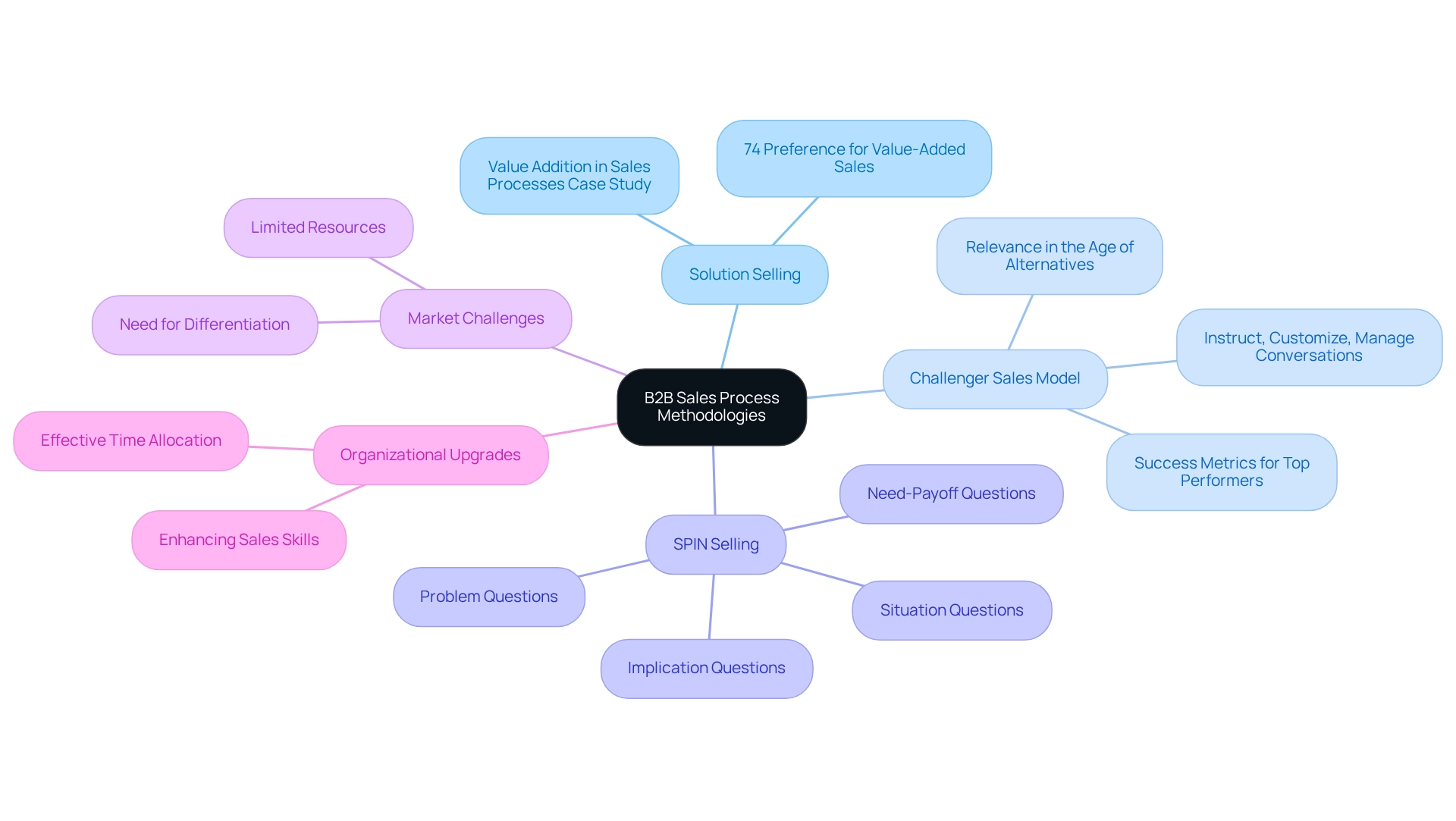
Establishing a robust foundation in prospect generation and qualification is essential for B2B success. To achieve this, consider the following key approaches:
Identifying Target Markets: Clearly define your ideal client profile by assessing factors such as industry, company size, and specific needs. This targeted strategy ensures that your efforts are focused on the most promising prospects. Additionally, categorize your accounts based on the appropriate sales strategy required for success, rather than solely by industry or client size, to enhance your revenue productivity.
Utilizing Multiple Channels: Employ a diverse range of channels to generate prospects, including social media, email marketing, and networking events. This multi-channel strategy increases visibility and engagement, allowing companies to connect with prospective clients where they are most active.
Establishing Scoring for Prospects: Develop a scoring system that ranks prospects based on criteria such as interaction level and alignment with your ideal customer profile. This approach enables sales teams to focus their efforts on the most promising leads, thereby enhancing efficiency and effectiveness.
Qualifying Prospects: Implement frameworks like BANT (Budget, Authority, Need, Timing) to evaluate the viability of prospects. This structured qualification process helps identify which prospects are most likely to convert, ensuring that resources are allocated effectively. Furthermore, mastering consultative selling techniques, such as presenting the issue upfront and building trust, can significantly enhance your strategy for qualifying opportunities and closing deals. Concentrating on these aspects not only assists companies in connecting with suitable prospects but also substantially boosts conversion rates. In fact, 52% of companies recognize the source of prospects as a critical factor in scoring, underscoring the importance of strategic prospect generation efforts. However, many organizations face challenges in generating prospects, including a lack of a clear approach for prospect development and insufficient audience insights, which can hinder their success. Moreover, 39.5% of marketers believe that access to more precise data could enhance their marketing initiatives, highlighting the need for improved analytics in prospect generation strategies. Tools like those provided by Databox can support businesses in tracking lead generation metrics and insights, optimizing their strategies effectively. Additionally, it is noteworthy that podcasts, blog posts, and videos rank as the top three content types for generating awareness and demand, as highlighted by CMI. By adopting these best practices, B2B companies can navigate the complexities of the market landscape and refine their sales processes to achieve sustainable growth.
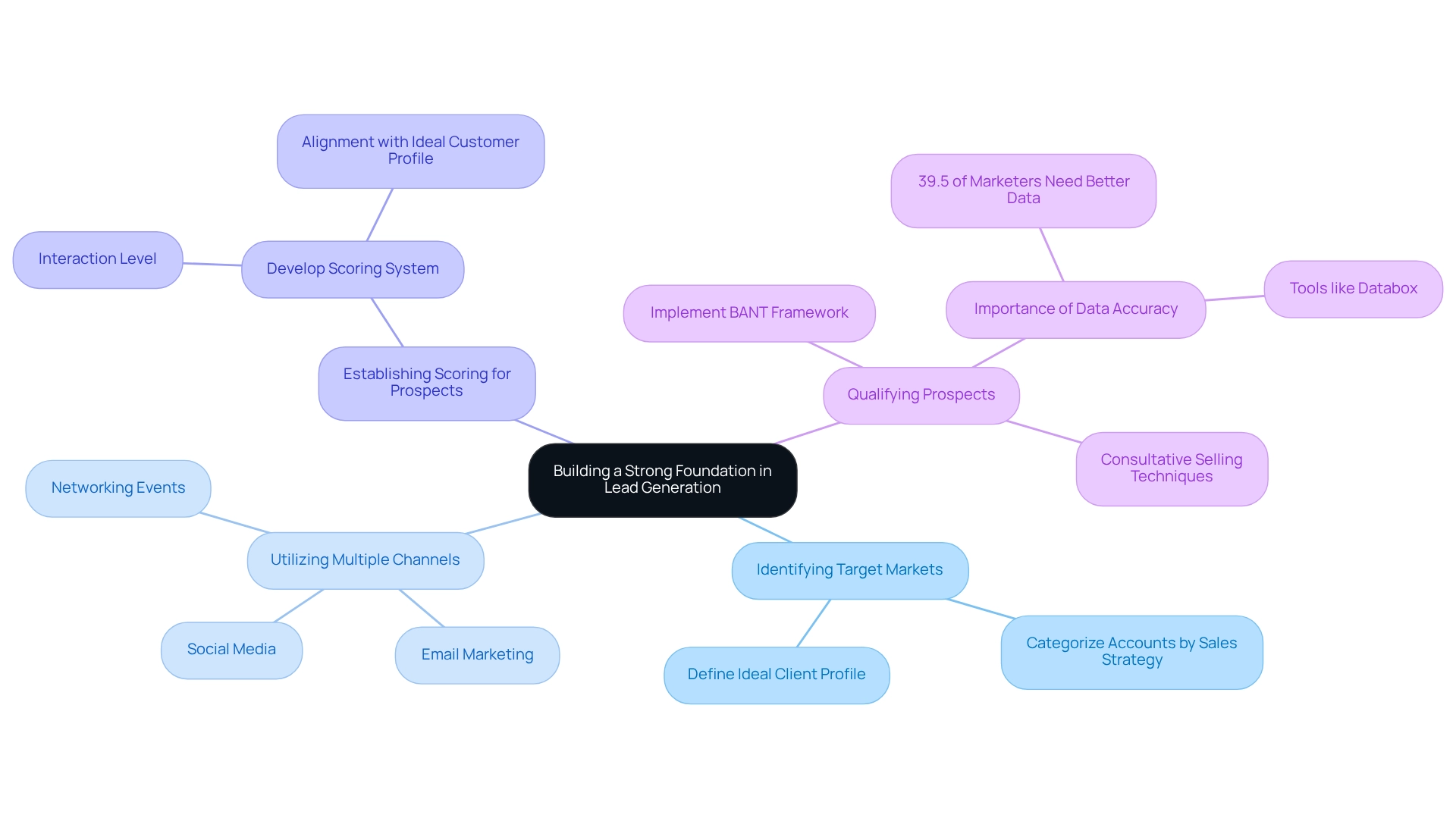
To enhance B2B sales processes, businesses should consider integrating the following technologies and automation tools:
Customer Relationship Management (CRM) Systems: These systems centralize customer data and interactions, significantly improving relationship management. By automating data input, CRMs enable representatives to concentrate on boosting conversions within B2B sales processes, tackling frequent obstacles in finalizing agreements and improving client experiences. A key advantage of CRM systems is their capacity to enhance client experiences, as studies show that 38% of consumers return to brands that offer a positive client experience, emphasizing the essential role CRMs play in nurturing these relationships.
Revenue Automation Tools: Automating repetitive tasks such as email follow-ups and lead scoring can free up valuable time for revenue teams. This efficiency is vital, as timely and tailored interactions are essential for maintaining client satisfaction and loyalty.
Data Analytics: Employing analytics tools allows companies to acquire understanding of client behavior and revenue performance. This data-driven method aids informed decision-making, enabling teams to customize their strategies effectively.
Artificial Intelligence (AI): Utilizing AI-driven solutions for lead scoring, predictive analytics, and tailored customer interactions can significantly improve sales procedures. AI technologies are increasingly being embraced in B2B sales processes, with current trends indicating a shift towards more advanced, automated solutions that enhance both efficiency and effectiveness. For example, the newest CRM technologies for 2025 are anticipated to include sophisticated AI functionalities that enhance transaction processes.
Alongside these technologies, implementing customized frameworks and strategies, such as those provided by Magical Selling, can tackle pressing challenges like quota management and market competition. The Seller Dimension framework highlights deal creation, progression, and closing, equipping teams with the resources they require to thrive in competitive environments. Additionally, the Business Gym membership can significantly improve the selling abilities of team members through customized frameworks, tips, and prescriptions.
A compelling case study illustrating the impact of revenue automation is the resilience of door-to-door marketing, which continues to generate nearly $30 billion annually despite the rise of digital methods. The typical conversion rate for these marketing methods falls between 2% and 3%, illustrating that direct interactions continue to be essential in establishing trust with clients. Successful strategies in this domain rely on persistence and high-volume prospecting, underscoring the importance of personal engagement even in an increasingly automated landscape.
This equilibrium between traditional approaches and modern technologies is crucial for enhancing B2B sales processes.
As Sampriti Singha Roy noted, "At Freshworks, there’s more to ‘Wednesday biryani’ than its delicious medley of aromatic spices; it embodies the spirit of craftsmanship—one of Freshworks’ core values." This sentiment reflects the craftsmanship required in transactional processes, emphasizing the value of personal interactions alongside technological advancements.
By incorporating these technologies and utilizing customized approaches, including techniques like the Heart of the Deal Method and the Problem Statement Method, businesses can enhance their B2B sales processes, leading to better efficiency and increased conversion rates, ultimately fostering sustainable growth in the competitive B2B market. Furthermore, the case analysis of overhauling marketing approaches for a regional infrastructure supplier demonstrates how applying these methods enabled the provider to compete with major cloud companies and achieve a 5% market share.
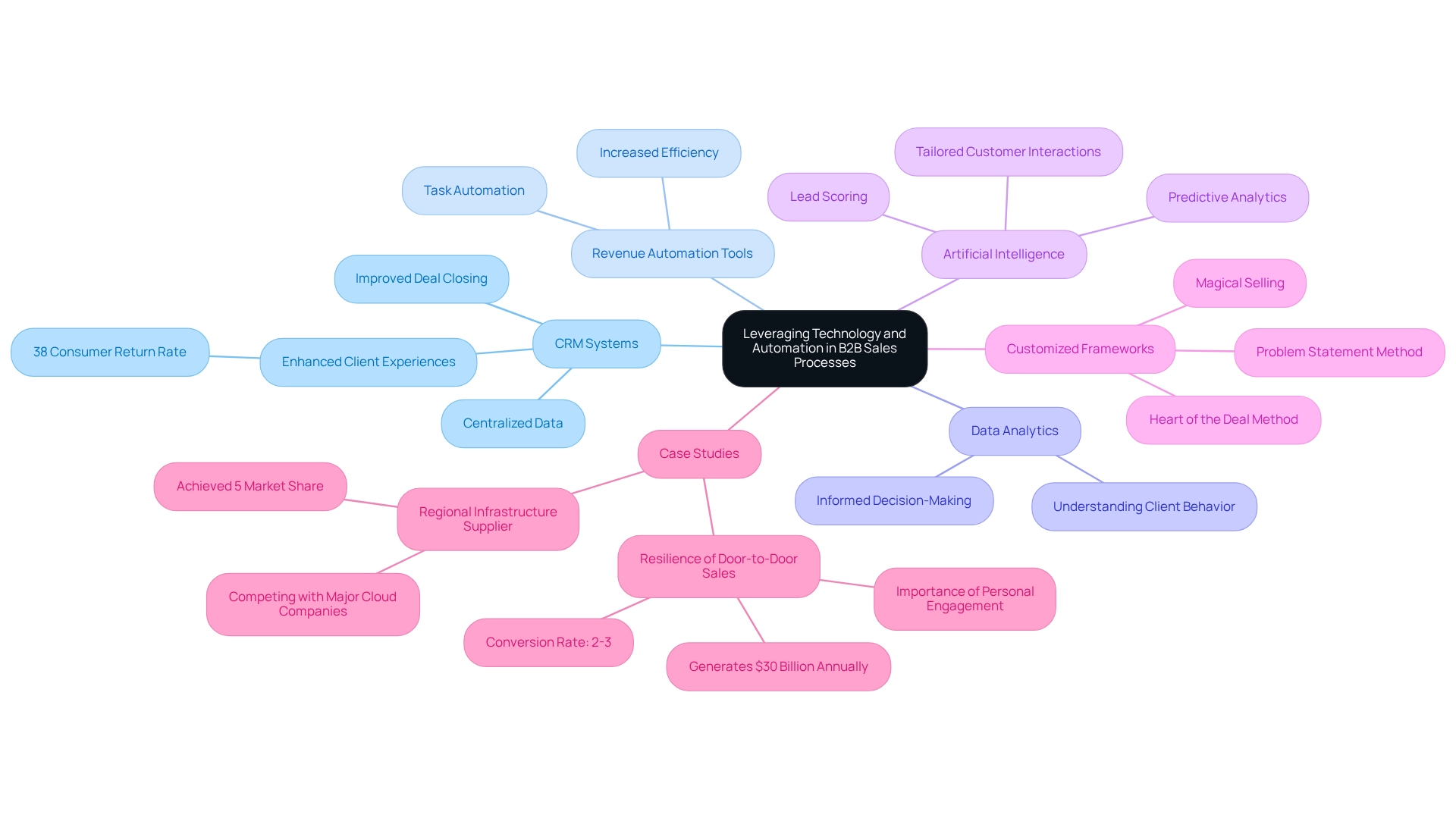
Post-sale follow-up strategies are essential for nurturing client relationships and driving future sales. Consider these key approaches:
Thank You Communication: A personalized thank-you note can significantly influence client perception. By expressing genuine gratitude for their business, you cultivate goodwill and create a favorable atmosphere for future engagements.
Regular Check-Ins: Arranging follow-up calls or emails is vital to ensure client satisfaction. These interactions allow businesses to swiftly address any concerns, reinforcing the individual's value to the company. Research indicates that 70% of sales leaders report a decrease in risk-taking, which can hinder relationship-building efforts. Regular check-ins counteract this trend by fostering open communication and trust. Notably, Tuesdays are the optimal day for email interactions, with Thursdays following closely, making them excellent choices for sending initial and follow-up messages.
Feedback Gathering: Actively seeking client feedback through surveys or direct discussions is crucial, especially for training modules like Magical Selling's 'Disruptive Alternative – Module 10'. This practice not only helps identify areas for improvement but also demonstrates that the company values its clients' insights. The lack of reviews for the 'Net Neutral Account – Module 7' highlights the necessity of feedback to enhance the training experience. Furthermore, testimonials for the 'Disruptive Alternative – Module 10' can serve as compelling social proof, motivating prospective clients to engage with the module. Lisa Ross notes that 75% of online shoppers prefer a phone call before companies cease follow-up efforts, underscoring the importance of maintaining engagement. Therefore, we encourage clients to share their experiences and insights to help us improve.
Upselling and Cross-Selling: Identifying opportunities to offer additional products or services can significantly enhance the client experience. By understanding the client's needs and preferences, companies can tailor their offerings, resulting in increased satisfaction and loyalty. Implementing these strategies not only fosters enduring connections but also boosts customer allegiance, ultimately leading to greater revenue through referrals and repeat business. A study on sales follow-up effectiveness reveals that 90% of sales representatives recognize the importance of cultivating long-term relationships over focusing on immediate gains, emphasizing the value of these post-transaction strategies.
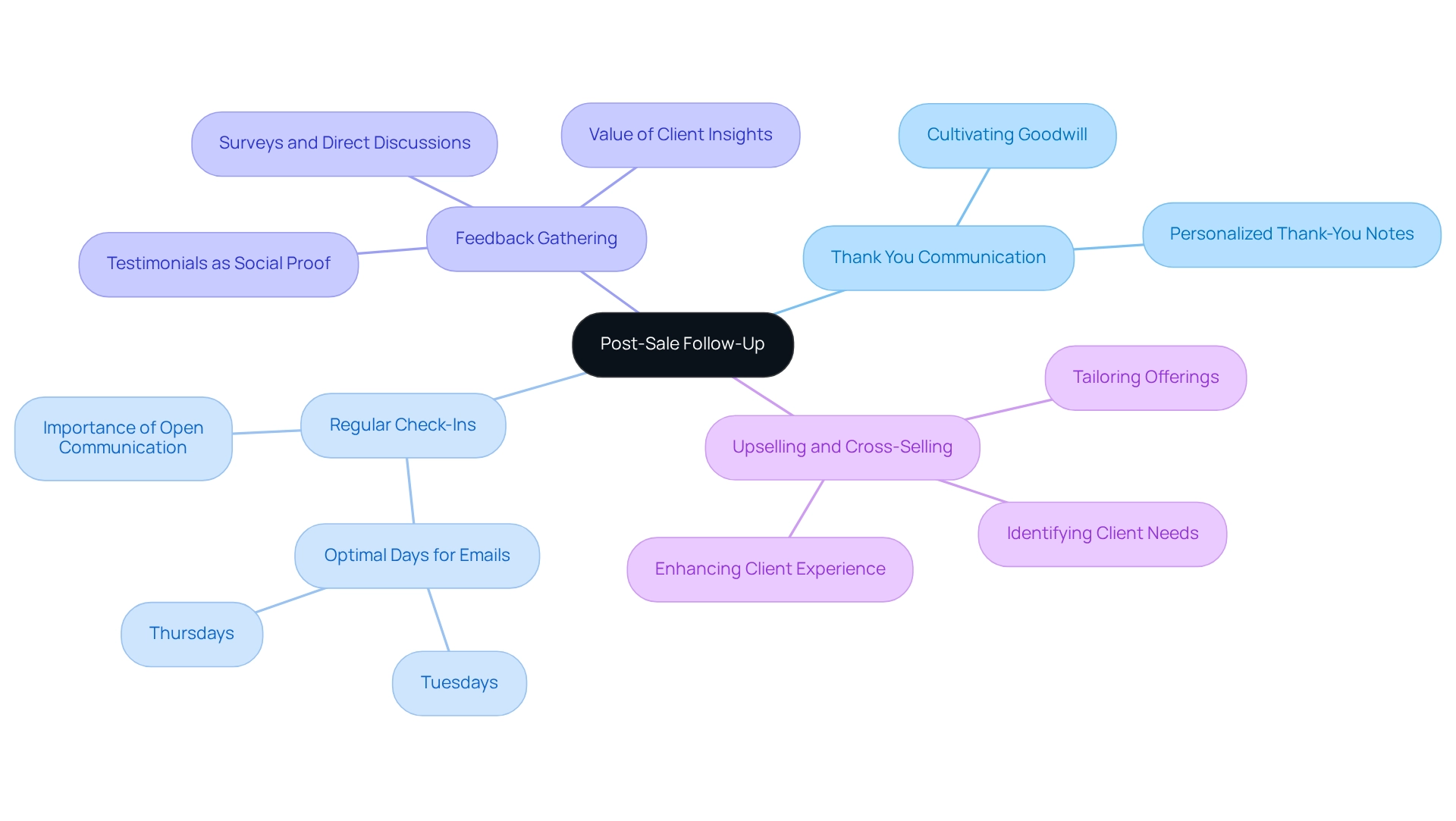
To effectively implement and optimize B2B revenue processes, businesses must adhere to the following best practices:
Define Clear Objectives: Establish specific, measurable goals for your revenue process. This clarity not only guides efforts but also facilitates tracking progress, ensuring that teams remain aligned with overarching business objectives. Organizations employing cohesive marketing approaches have reported a 20% year-over-year increase, underscoring the significance of well-defined goals in achieving success.
Regular Training and Development: Ongoing investment in education is crucial for teams. Continuous learning keeps professionals informed about best practices and new technologies, significantly influencing B2B sales processes and overall performance. Magical Selling's training programs emphasize consultative selling techniques, equipping teams to establish credibility and effectively sell solutions. A case analysis on revenue training statistics highlights the essential role of continuous, customized instruction in developing efficient B2B sales processes. Businesses that prioritize such training frequently observe a substantial enhancement in their revenue results, with data suggesting that those investing in continuous training achieve improved performance and increased income.
Monitor and Analyze Performance: Utilizing key performance indicators (KPIs) is vital for evaluating the effectiveness of your B2B sales processes. Regular analysis helps identify areas for improvement, enabling teams to adapt strategies based on data-driven insights. For instance, organizations that implement AI tools report improved data quality and more tailored interactions with clients. Notably, 81% of revenue teams are investing in AI, which can lead to enhanced efficiency in selling. Quick, decisive measures in response to performance metrics can shift the situation in your favor, yielding concrete outcomes that impact your financial results.
Encourage Teamwork Between Departments: Promoting interaction and cooperation among marketing, service, and support teams is essential for a unified strategy. This collaboration ensures that all divisions work towards shared objectives, enhancing the overall customer experience and fostering success. By adopting these optimal strategies, companies can create robust B2B sales processes that not only drive achievement but also adapt to the ever-changing market landscape. Industry insights reveal that the typical B2B transaction cycle lasts around 65 days, according to Dmytro Chervonyi, highlighting the necessity for efficiency and effectiveness in sales approaches. Furthermore, a structured approach to sales processes can lead to significant growth, as evidenced by the 20% year-over-year growth reported by companies utilizing integrated sales and marketing strategies.
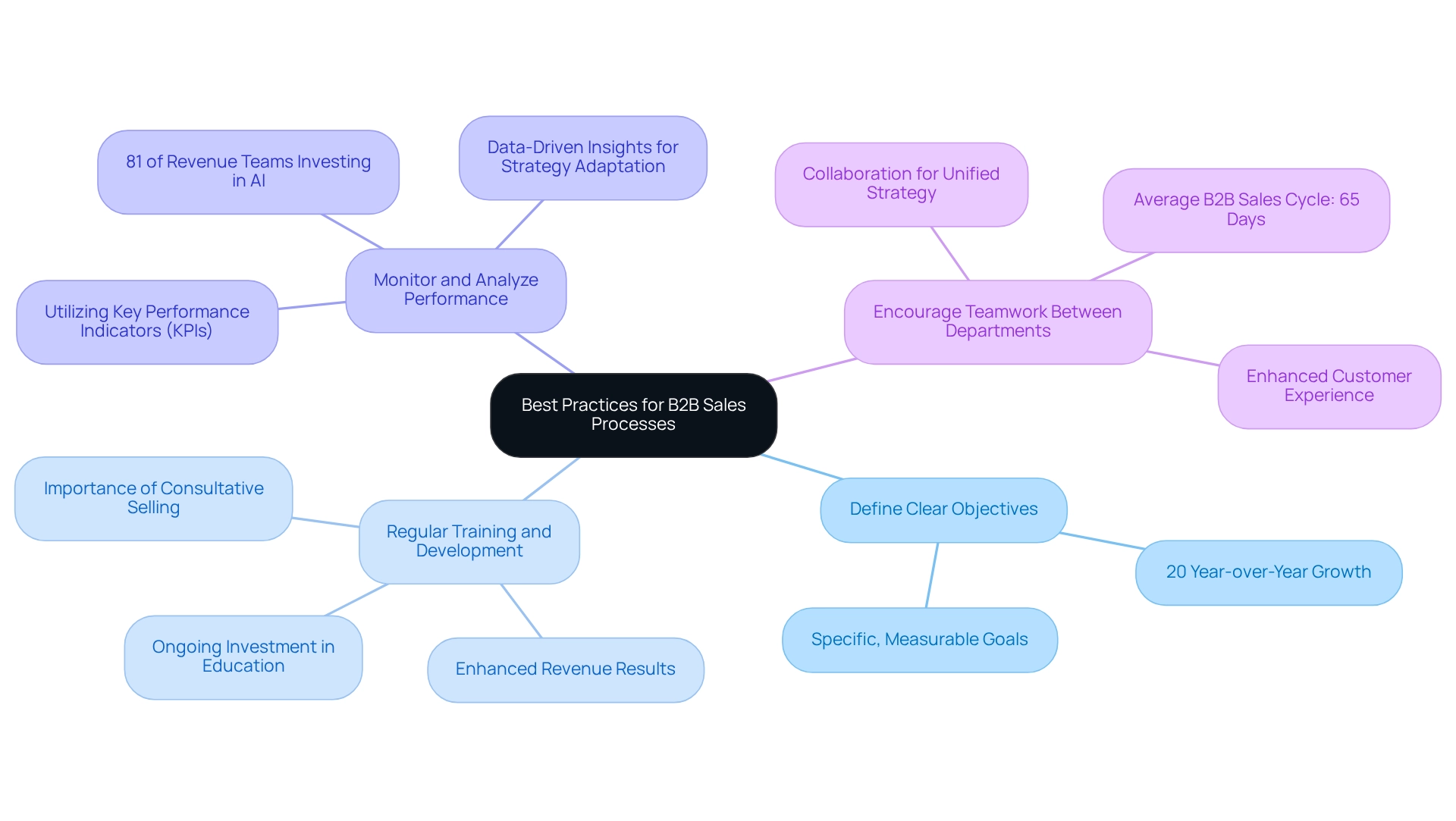
Understanding the complexities of B2B sales processes is crucial for businesses aiming to excel in a competitive environment. This exploration highlights key components such as:
These components form the backbone of effective sales strategies. By implementing methodologies like Solution Selling and the Challenger Sales Model, organizations can tailor their approaches to meet the unique needs of their clients, ultimately fostering stronger relationships and driving higher conversion rates.
Furthermore, the integration of technology and automation is transforming the B2B landscape, enhancing efficiency and enabling sales teams to focus on what truly matters—building and nurturing customer relationships. As businesses adapt to the evolving digital marketplace, leveraging tools like CRM systems and AI-driven insights becomes essential for maintaining a competitive edge.
In conclusion, a strategic approach to B2B sales that encompasses best practices, innovative frameworks, and the latest technologies empowers organizations to optimize their sales processes and achieve sustainable growth. By prioritizing relationship-building and adopting a customer-centric mindset, businesses can navigate the complexities of B2B sales successfully, ensuring long-term success in an ever-changing market.
What are the key steps in the B2B sales process?
The key steps in the B2B sales process include lead generation, qualification, managing the transaction cycle, and client relationship management (CRM).
What is lead generation in B2B sales?
Lead generation is the foundational process of identifying potential clients who may be interested in your products or services. It is increasingly important, with 85% of B2B marketers using email marketing tools to enhance outreach and engagement.
How does qualification work in B2B sales?
Qualification involves assessing whether generated leads align with the target customer profile. This process ensures that marketing efforts focus on leads with the highest potential for conversion, enhancing resource distribution and maximizing revenue efficiency.
What does the transaction cycle refer to in B2B sales?
The transaction cycle refers to the duration from the initial contact with a lead to the finalization of a deal. Understanding this cycle is essential for managing time effectively and improving conversion rates.
Why is client relationship management (CRM) important in B2B sales?
Efficient CRM systems are essential for managing interactions with prospective and existing clients, improving data management, and facilitating tailored interactions. They are increasingly crucial as many sales groups invest in AI technologies to enhance sales data quality and boost client engagement.
What distinguishes B2B transactions from B2C transactions?
B2B transactions typically involve a more complex decision-making process with multiple stakeholders and longer decision cycles, larger transaction volumes, and a focus on establishing enduring relationships compared to the quicker, individual-based decisions in B2C transactions.
How does relationship focus impact B2B sales?
Establishing lasting relationships is fundamental in B2B commerce. Successful relationship management can lead to increased customer loyalty and recurring business, with nurtured leads generating significantly more business opportunities compared to non-nurtured leads.
What trends are influencing B2B sales strategies?
Trends influencing B2B sales strategies include the rise of digital platforms for marketing, the increasing use of mobile devices by B2B buyers, and significant financial investments in marketing technology (MarTech) to enhance marketing strategies.